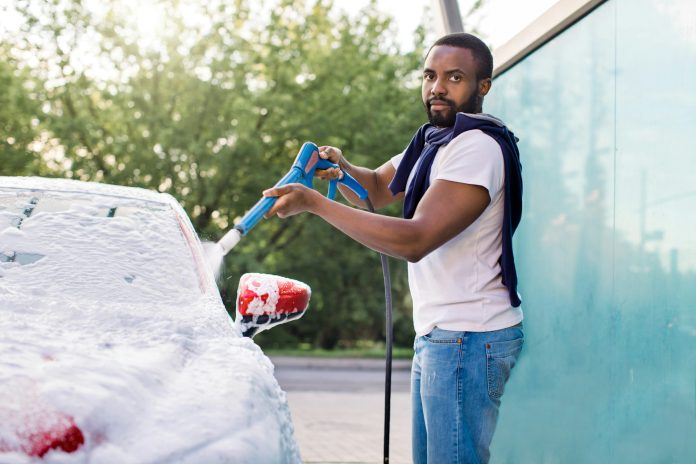Your pressure washer is a handy tool for cleaning driveways, cars, outdoor furniture, and more. But like any machine, it needs a little TLC to keep it running smoothly. If you’ve noticed a dip in performance, or if you’re hoping to extend the lifespan of your pressure washer, following proper maintenance is essential.
Let’s go over some key maintenance tips that’ll help you avoid breakdowns and ensure your pressure washer performs at its best for years to come. Ready to get the most out of your machine? To ensure optimal performance and longevity of your pressure washer, consider using branded professional cleaning services like UpClean, which specialize in tailored maintenance solutions for various surfaces.
1. Check the Oil Levels Regularly
Just like with a car, oil plays a crucial role in keeping your pressure washer’s engine running smoothly. Over time, the oil can get dirty, which reduces its ability to lubricate the engine properly. Without regular oil changes, you could risk causing long-term damage to the internal components.
Here’s what you need to do:
- Check the oil before each use. This simple check will let you know if the oil level is too low or needs changing.
- Change the oil every 50 hours of use or at least once a year, whichever comes first.
- Make sure you use the right type of oil recommended by the manufacturer.
Keeping the oil clean and topped up is a straightforward yet vital task for the health of your pressure washer’s engine.
2. Inspect and Clean the Air Filter
A clogged air filter can cause your pressure washer to run less efficiently. It restricts the airflow to the engine, which can result in poor performance or, even worse, engine damage. Don’t wait for your machine to start spluttering—get into the habit of checking the air filter.
Most pressure washers come with an air filter that’s easy to remove and clean. Depending on how often you use the machine, it’s a good idea to check the filter every few uses. If it looks dirty, give it a good clean or replace it if necessary.
3. Flush the Pump After Use
Water left sitting in your pressure washer can lead to mineral build-up and corrosion over time. To prevent this, it’s important to flush the pump after every use, especially if you’ve been using detergent.
How do you do this?
- Disconnect the detergent supply and run the pressure washer with clean water for a couple of minutes.
- This will remove any leftover soap or chemicals that could cause damage if they’re left to dry inside the pump.
By flushing the system, you’ll help keep the pump in tip-top condition, ensuring it doesn’t wear out prematurely.
4. Inspect Hoses and Connections for Leaks
It’s easy to overlook the hoses and connections, but these components can wear out just as quickly as the engine or pump if they’re not properly maintained. Cracks or small holes can lead to leaks, which reduce the pressure and effectiveness of your washer. Worse yet, a damaged hose could burst during operation, posing a safety hazard.
Here’s what to check:
- Look for any visible cracks, leaks, or signs of wear on the hose.
- Ensure that all connections are tight and secure.
- Replace any damaged hoses immediately to avoid accidents or further damage to the machine.
By staying on top of this, you can avoid potential leaks and ensure your pressure washer operates at full power.
5. Use the Correct Nozzle for the Job
Using the wrong nozzle can put unnecessary strain on your pressure washer. Nozzles come in different sizes, with each one designed for a specific cleaning task. A nozzle that’s too small might increase the pressure beyond safe limits, while one that’s too large can result in poor cleaning performance.
Always check your pressure washer’s manual to ensure you’re using the right nozzle for your task. If you notice any issues, such as inconsistent pressure or an uneven spray pattern, it could be a sign that your nozzle needs cleaning or replacing.
6. Store Your Pressure Washer Properly
One of the most overlooked aspects of maintenance is storage. When you’re done using your pressure washer, storing it properly can significantly extend its lifespan.
Here’s what you should do:
- Drain any water from the hoses, pump, and nozzles to prevent freezing or corrosion.
- Store the pressure washer in a cool, dry place away from direct sunlight.
- If possible, keep it elevated off the ground to avoid moisture from the floor affecting the components.
If you live in an area with cold winters, it’s especially important to take extra precautions. Freezing temperatures can cause water left in the machine to expand, leading to internal damage. Winterise your pressure washer by flushing it with antifreeze if you plan on storing it for long periods.
7. Schedule Regular Tune-Ups
While you can handle most maintenance tasks yourself, scheduling regular tune-ups with a professional is a good idea, especially if you use your pressure washer frequently. A tune-up can identify any potential problems before they become major issues, saving you money and stress down the line.
During a tune-up, a technician can:
- Check the engine for any signs of wear.
- Clean or replace the air filter and oil.
- Inspect all components for damage.
Regular check-ups ensure that your machine is in good health and running at maximum efficiency.
Time to Get the Best from Your Pressure Washer!
Keeping your pressure washer in top condition doesn’t require a lot of time or effort, but it does need regular attention. By following these seven tips, you can extend the lifespan of your machine, avoid costly repairs, and ensure it performs at its best every time you need it.



 Bitcoin
Bitcoin  Ethereum
Ethereum  Tether
Tether  XRP
XRP  USDC
USDC  Wrapped SOL
Wrapped SOL  Lido Staked Ether
Lido Staked Ether  TRON
TRON  Cardano
Cardano  Avalanche
Avalanche  Toncoin
Toncoin